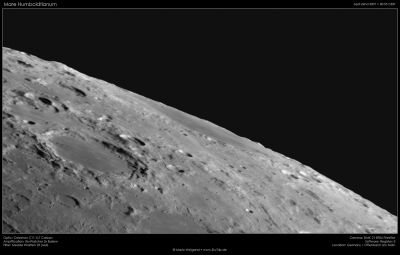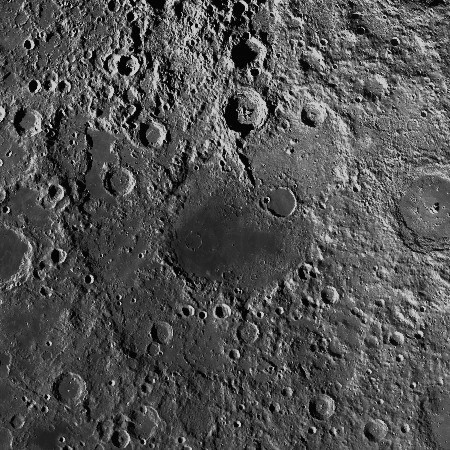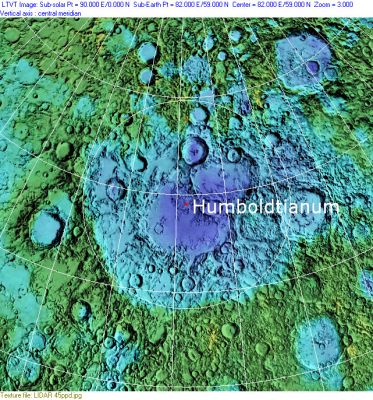Humboldtianum, Mare
Contents
Humboldtianum Basin
(unofficial name; IAU feature name for central 273 km of mare: Mare Humboldtianum )
|
Lat: 56.8°N, Long: 81.5°E, Main ring diam: 650 km, Depth: 2.98 km, Rükl 7 |



Left: Mario Weigand, Mare Humboldtianum and Endymion, . Center: LROC
Right: Clementine. The dot is the center position and the white circle the main ring position from Chuck Wood's Impact Basin Database.
Table of Contents
[#Humboldtianum Basin Humboldtianum Basin]
[#Humboldtianum Basin-Images Images]
[#Humboldtianum Basin-Maps Maps]
[#Humboldtianum Basin-Basin Classification Basin Classification]
[#Humboldtianum Basin-Description Description]
[#Humboldtianum Basin-Description: Wikipedia Description: Wikipedia]
[#Humboldtianum Basin-Additional Information Additional Information]
[#Humboldtianum Basin-Nomenclature Nomenclature]
[#Humboldtianum Basin-LPOD Articles LPOD Articles]
[#Humboldtianum Basin-EPOD Articles EPOD Articles]
[#Humboldtianum Basin-Lunar 100 Lunar 100]
[#Humboldtianum Basin-Bibliography Bibliography]
Images
LPOD Photo Gallery Lunar Orbiter Images
- Lunar Orbiter stereo
- Mare Humboldtianum was also captured in Apollo 13's Hasselblad frame AS13-60-8674.- DannyCaes DannyCaes Nov 18, 2012
Maps
(LAC zone 15A3) USGS Digital Atlas PDF
Basin Classification
(description of terms and most numeric basin data from Wood, C.A. (2004) Impact Basin Database)
| Certainty of Existence |
USGS Age |
Wilhelms Age Group |
Ring Diameters |
Mare Thickness |
Mascon |
| Certain |
Nectarian |
11 |
250, 340, 460, 650, 1050, 1350 |
Yes |
Description
A multi-ring impact basin that contains a patch of lava named Mare Humboldtianum.
Description: Wikipedia
Additional Information
- Depth data from Kurt Fisher database
- Cherrington, 1969: 2.98 km
- Mare area of 35,475 km^2 according to measurements by Jim Whitford-Stark.
- Compton, a farside crater located "behind" Mare Humboldtianum, is rather difficult to observe during favourable libration. However, the central peak of Compton is quite an easy target because of the pronounced shape of it (relatively steep slopes). See LPOD Peaking over the Limb and discussions.
- One of three basins with crustal thicknesses less than 5 km. The Crust of the Moon as Seen by Grail by Wieczorek et al (2013).
- Atypical exposure of olivine-rich material - from mantle? - surrounding this basin. Yamamoto et al (2010) Nat. Geosci. 3, 533.
Nomenclature
- The IAU feature name (Latin for "Humboldt Sea") honors Friedrich Wilhelm Heinrich Alexander von Humboldt(September 14, 1769 – May 6, 1859), a German naturalist and explorer. Humboldt's quantitative work on botanical geography was foundational to the field of biogeography. He was one of the first to propose that the lands bordering the Atlantic were once joined (South America and Africa in particular). Late in life, in his five-volume work Cosmos, he attempted to unify the various branches involved in knowledge of the world. The scope of this remarkable work may be briefly described as the representation of the unity amid the complexity of nature. In it the large and vague ideals of the 18th are sought to be combined with the exact scientific requirements of the 19th century. And, in spite of inevitable shortcomings, the attempt was in an eminent degree successful.
- The impact basin is named after the mare.
- Once called Pappi by Langrenus, Palus Amadoca by Hevelius, and Zoroaster by Riccioli. Madler's name Mare Humboldtianum is still used and officially recognized by the IAU (see also: Ewen A. Whitaker's Mapping and Naming the Moon).
- The inner and outer rings of Mare Humboldtianum are unofficially called the Andes Mountains (outer ring) and the Bishop Mountains (inner ring). Source: Charles Wood.
LPOD Articles
Angular Basin
Another Basin on Another Limb
Extreme Limb
Humble Topo
Rings on the Rim
A Wonderful Corner
Zoroaster
A New Mare to Study
Breakfast Tales
EPOD Articles
Lunar 100
L70: Multi-ring impact basin.
Bibliography
Harold Hill. A Portfolio of Lunar Drawings, pages 42, 43 (see also: Bel'kovich).
This page has been edited 1 times. The last modification was made by - tychocrater tychocrater on Jun 13, 2009 3:24 pm - afx2u2